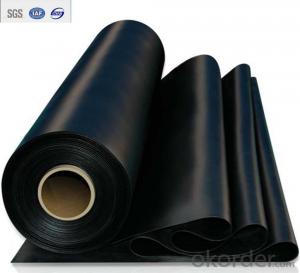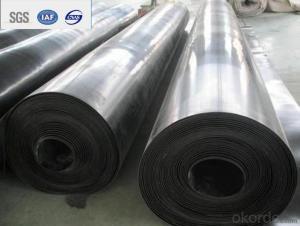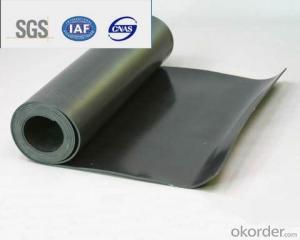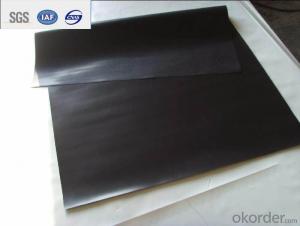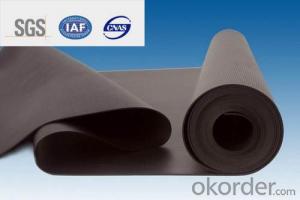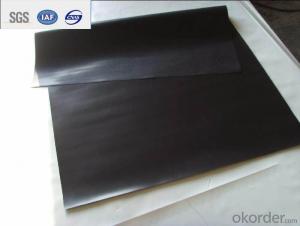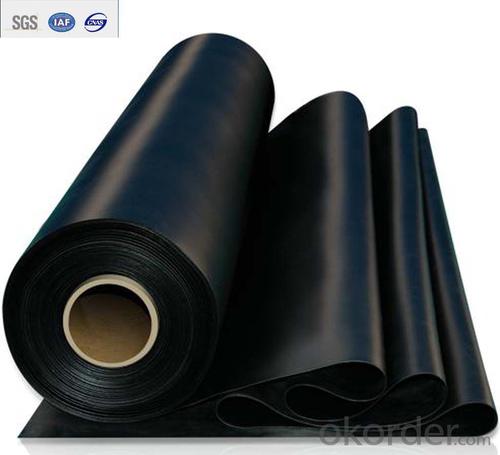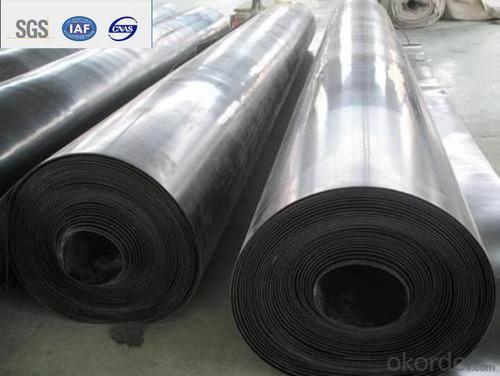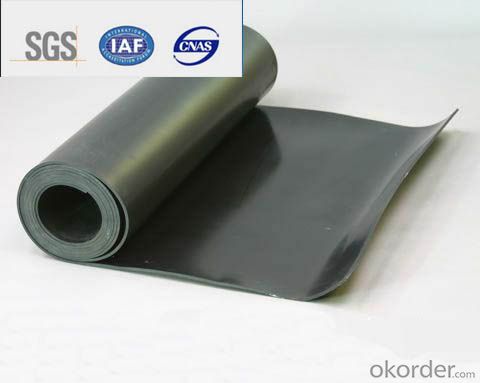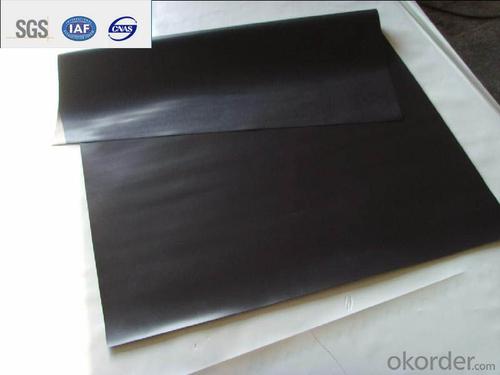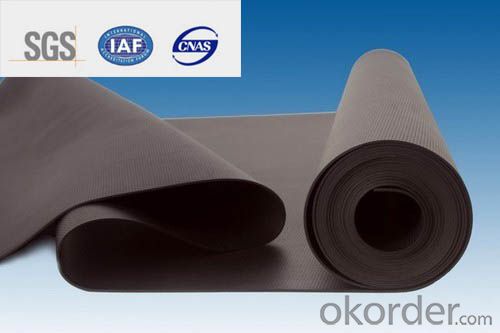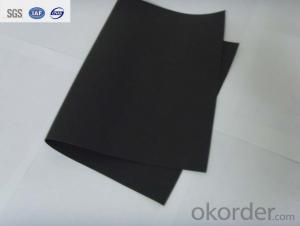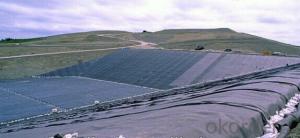EPDM Waterproofing Roofing Membrane with 2.0mm
- Loading Port:
- Qingdao
- Payment Terms:
- TT OR LC
- Min Order Qty:
- 2000 m²
- Supply Capability:
- 800000 m²/month
OKorder Service Pledge
OKorder Financial Service
You Might Also Like
Description Of EPDM Rubber Waterproof Membrane:
1. EPDM waterproof membrane is made from ternary ethylene-propylene rubber, which is for waterproofing of exposed and non-exposed applications.
2. EPDM waterproof membrane production adopts the world-advanced equipment of cold feeding extrusion and continuous vulcanization technology.
3. EPDM waterproof membrane is of high elasticity among high polymer waterproof materials and becomes a world-popular waterproofing material.
Main Features of EPDM Rubber Waterproof Membrane:
1. Excellent physical and mechanical performance
2. High tearing resistance
3. Good deformation adaptability
4. High puncture resistance
5. High aging resistance
6. UV resistance
Specifications of EPDM Rubber Waterproof Membrane:
Material | EPDM Rubber |
Size | 1.2m (width)*20m (length) or customized, weldable type 2.05m or 4m width |
Thick | 1.2mm, 1.5mm, 2.0mm |
Type | Vulcanized & Weldable |
Pattern | Non-reinforced (homogeneous) |
Certificate | ISO9001/14001 |
Applications of EPDM Rubber Waterproof Membrane:
1.Roofs, Basement, Toilets
2. Industrial and civil building waterproofing
3. Geosynthetic liner for swimming pool, channels, irrigation system
4. Especially suitable for projects with high requirements in durability, anti-corrosion and deformation.
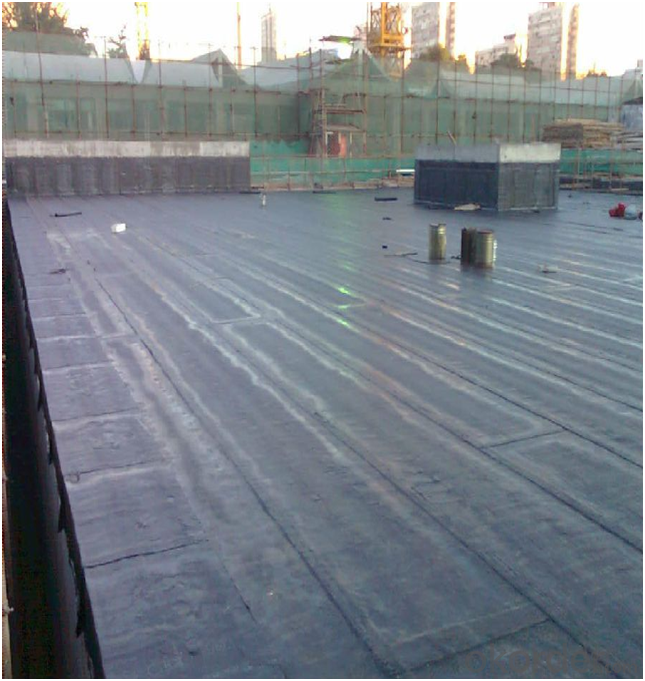
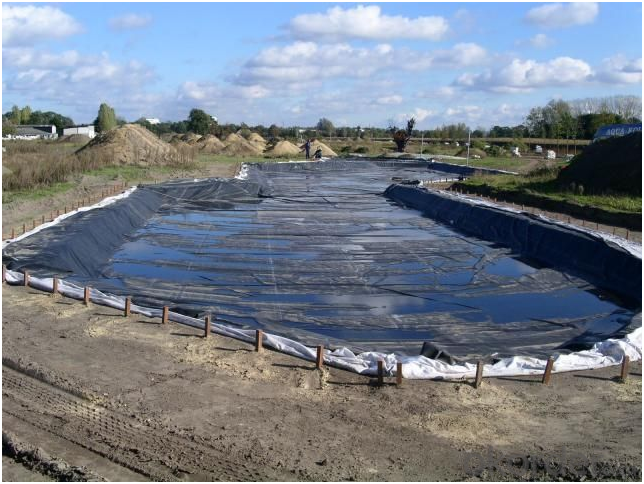
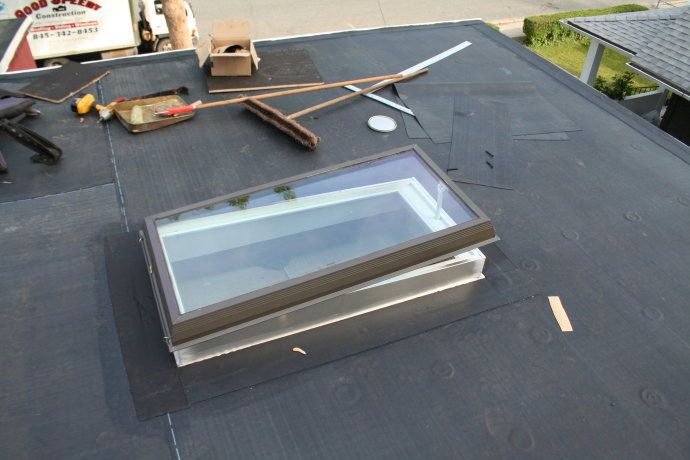
FAQ:
1. What are we supplying?
We are specialized in producing Colorful Asphalt Roof Shingle, SBS/APP modified bitumen waterproof membrane, Self adhesive bitumen waterproof membrane, PVC waterproofing membrane, EPDM rubber roofing membrane, Single Component Polyurethane Waterproof Coating, and Spray Polyurea Waterproof Coating.
2. How Many years experience do we have?
We have been exported to more than 20 countries in the past 15 years.
3. How long do we usually reply your request?
We always reply our customer within 24 hours.
- Q: Does a waterproofing membrane require any special cleaning or maintenance procedures?
- Yes, a waterproofing membrane typically requires special cleaning and maintenance procedures to ensure its effectiveness and longevity. Regular inspections, cleaning off debris, and addressing any damage or wear are essential to prevent leaks or deterioration. Additionally, specific cleaning products and techniques may be recommended by the manufacturer or installer to maintain the membrane's performance.
- Q: Can a waterproofing membrane be repaired if damaged?
- If a waterproofing membrane gets damaged, it is possible to repair it. The repair method and whether it can be fixed on-site or by a professional will depend on the extent of the damage. Minor punctures or tears in the membrane can usually be patched using a sealant or adhesive. However, more significant or severe damage may necessitate the replacement of a section of the membrane. It is crucial to promptly address any damage in order to prevent additional water penetration and potential structural problems.
- Q: Are waterproofing membranes resistant to earthquake-induced water pressure?
- Yes, waterproofing membranes are designed to be resistant to earthquake-induced water pressure. These membranes are specifically engineered to provide a barrier against water infiltration, even under high-pressure situations caused by an earthquake.
- Q: Are waterproofing membranes suitable for residential basements?
- Residential basements can indeed benefit from the use of waterproofing membranes. These membranes are specifically engineered to avert water infiltration and safeguard the basement against any harm caused by moisture. Whether applied on the interior or exterior walls, they create a formidable barrier against both water and dampness. This, in turn, helps to stave off problems like mold growth, water damage, and structural decay. With their excellent durability and ability to foster a dry and wholesome living space, waterproofing membranes emerge as a highly effective solution for residential basements.
- Q: Can a waterproofing membrane be used on tunnels with subway systems?
- Tunnels with subway systems can indeed benefit from the use of a waterproofing membrane. It is strongly advised to incorporate this protective layer into subway tunnel construction to prevent water infiltration and potential harm to the structure and electrical systems. The waterproofing membrane acts as a barrier, effectively excluding water and safeguarding the tunnel against issues caused by moisture, such as corrosion, mold, and deterioration. It is crucial to select a waterproofing membrane that is specially designed for tunnel use and capable of withstanding the unique challenges and conditions of subway systems, including heavy traffic loads, vibrations, and exposure to chemicals. Moreover, it is essential to ensure the installation of the waterproofing membrane is carried out by experienced professionals who adhere to the appropriate guidelines and specifications, guaranteeing its effectiveness and durability.
- Q: Can a waterproofing membrane be used on sloped roofs?
- Yes, a waterproofing membrane can be used on sloped roofs. In fact, it is often recommended to use a waterproofing membrane on sloped roofs to prevent water infiltration and potential leaks. The membrane acts as a barrier, preventing water from seeping into the roof structure and causing damage. Additionally, the membrane can also help to protect the roof from other elements such as UV rays, temperature fluctuations, and mechanical stresses. It is essential to choose a waterproofing membrane that is specifically designed for sloped roofs and is compatible with the roofing material to ensure long-lasting protection.
- Q: Are there any specific considerations for installing a waterproofing membrane on precast concrete surfaces?
- Yes, there are specific considerations for installing a waterproofing membrane on precast concrete surfaces. Firstly, the surface must be thoroughly cleaned and free from any dirt, debris, or loose particles. It is also important to ensure that the precast concrete surface is dry before applying the membrane. Additionally, the type of waterproofing membrane used should be compatible with the precast concrete material to ensure proper adhesion. Proper surface preparation, material compatibility, and ensuring a dry surface are key factors to consider when installing a waterproofing membrane on precast concrete surfaces.
- Q: Can a waterproofing membrane be used for water fountains or decorative features?
- Yes, a waterproofing membrane can be used for water fountains or decorative features. It is designed to prevent water leakage and protect surfaces from water damage, making it an ideal choice for these applications.
- Q: Can a waterproofing membrane be used on tunnels with electrical installations?
- Tunnels with electrical installations can benefit from the use of a waterproofing membrane. The main purpose of this membrane is to stop water from entering and causing moisture damage to the underlying structures. In order to ensure the smooth and safe functioning of the installations, it is crucial to safeguard the electrical equipment and wiring from water damage. Applying a waterproofing membrane to the walls and ceilings of the tunnel is an effective way to prevent any potential water ingress, thereby reducing the risk of harm to the electrical installations. However, it is important to seek advice from professionals who specialize in tunnel waterproofing to ensure that the chosen membrane is suitable for the specific needs of the tunnel and electrical installations. Factors such as fire resistance, electrical insulation, and durability should be taken into consideration when making this decision.
- Q: Can a waterproofing membrane be used for restaurants or kitchens?
- Restaurants or kitchens can indeed utilize waterproofing membranes. These membranes are frequently employed in these spaces to safeguard the foundational structure against water damage. Generally, they are installed in areas prone to water exposure such as floors, walls, and countertops. By preventing water infiltration into the building materials, waterproofing membranes avert deterioration, mold growth, and other related problems. Furthermore, these membranes are specifically designed to resist chemicals and stains commonly found in restaurant or kitchen settings. In conclusion, the use of a waterproofing membrane is an effective means to ensure the durability and longevity of the restaurant or kitchen, while also upholding a sanitary and hygienic environment.
Send your message to us
EPDM Waterproofing Roofing Membrane with 2.0mm
- Loading Port:
- Qingdao
- Payment Terms:
- TT OR LC
- Min Order Qty:
- 2000 m²
- Supply Capability:
- 800000 m²/month
OKorder Service Pledge
OKorder Financial Service
Similar products
Hot products
Hot Searches
Related keywords
